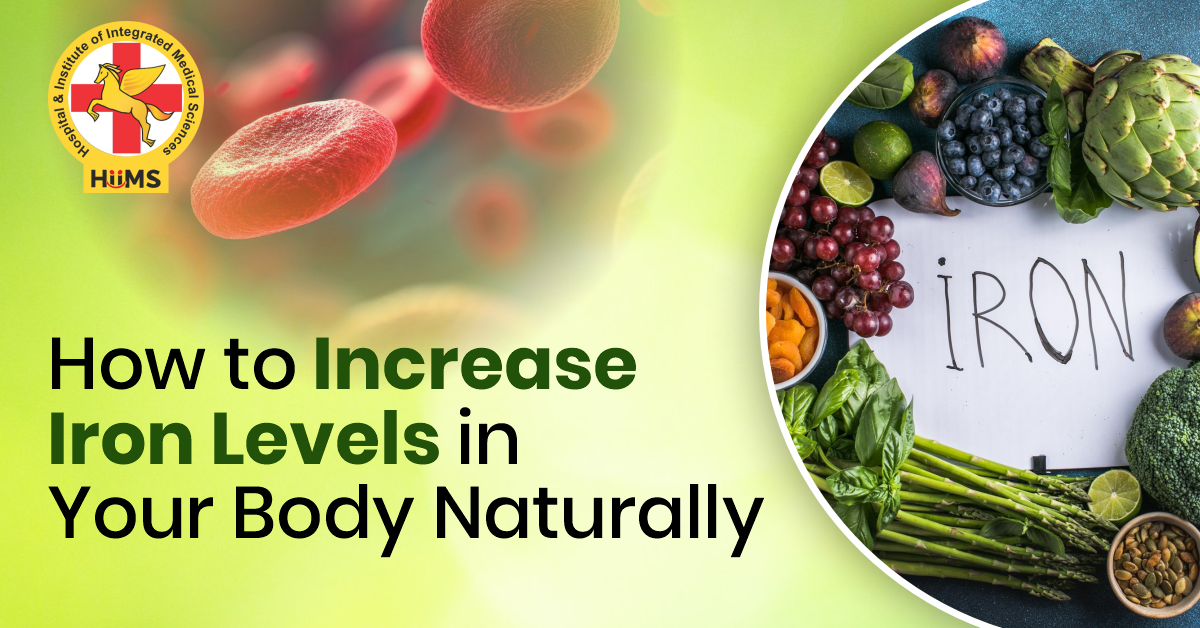Iron is among the most vital minerals that our body needs to function correctly. It is essential in the production of haemoglobin, which transports oxygen in the body to different parts. An iron deficiency may cause stamina as well as exhaustion, helplessness, lightheadedness, and, in severe stages, anaemia. There are many natural ways to boost iron safely, effectively, and cost-free, and they are readily available. This blog will explore how to increase iron levels naturally through diet, daily management, and Ayurvedic guidance.
What Is So Important about Iron?
Iron is required for the formation of red blood cells and the functioning of enzymes. It also helps boost the immune system and increase energy levels. Your body can not produce sufficient healthy red blood cells without enough iron, and this implies that your organs and tissues will lack sufficient oxygen.
10 Signs You May Have Low Iron Levels
- Constant exhaustion and low vitality
- Yellowish or pale skin.
- Breathlessness
- Regular headaches or lightheadedness
- Cold feet and hands.
- Palpitations in the heart
- Spoon-shaped or brittle nails
- Hair thinning or loss.
- Craving things that aren’t food.
- Brain fog or poor focus.
Increase Iron Levels Naturally
- Include Foods High in Iron in Your Diet
Your diet is the most effective and long-lasting way to naturally increase iron levels. Dietary iron comes in
- Iron-rich plant foods.
The following are great iron-rich foods that you can incorporate into your meals:
Plant-Based Iron Sources:
- Collard greens, kale, and spinach
- Chickpeas and lentils
- Sunflower seeds with pumpkin seeds
- Soybeans and tofu
- Amaranth and quinoa
- Molasses made from blackstrap
- Figs, apricots, and raisins are examples of dried fruits.
Iron absorption can be significantly enhanced by combining meals high in vitamin C, such as bell peppers, oranges, or lemon juice, with foods rich in iron from plant sources.
- Avoid Iron Blockers.
Your body may not be able to properly take in iron if you consume certain foods or chemicals. If you’re attempting to raise your iron levels naturally, think about reducing back on or timing your intake of these:
- Calcium: Although necessary for healthy bones, excessive calcium intake might prevent the absorption of iron.
- Phytates: These substances, which are present in whole grains and legumes, may lower the bioavailability of iron. This effect can be lessened by fermenting, sprouting, or soaking these foods.
- Use cookware made of cast iron.
A straightforward yet efficient way to incorporate trace amounts of iron into your diet is to cook with cast-iron pots and pans. Iron leaches into food, giving it a subtle boost, especially when cooking acidic foods like tomato-based recipes. It is one of the most effective natural ways to boost iron.
- Ayurvedic and Herbal Treatments
The ancient Indian medical system, known as Ayurveda, has long recognised the importance of maintaining optimal iron levels. The following are a few Ayurvedic medicines that can naturally raise iron levels:
- Ashwagandha: Promotes blood production and boosts energy levels.
- Shatavari: Promotes better digestion and increased absorption of iron.
- Liquorice root, also known as mulethi, nourishes the liver and balances metabolism.
- Enhance Digestive Health
A healthy digestive tract is necessary for good iron absorption. Nutrient absorption can be hampered by diseases such as leaky gut, celiac disease, and IBS. Consuming fermented foods can help support the body’s natural iron absorption mechanism and aid in rebuilding gut flora. This is a potent natural way to boost iron that is often overlooked.
- Adopt Iron-Friendly Routines
Iron health is significantly influenced by lifestyle. The following are some everyday routines to follow:
- Drink plenty of water, but refrain from doing so right before or right after meals.
- Keep your mealtimes consistent.
- Avoid stress, as it may impair nutrient absorption and digestion.
- Get enough sunlight to produce vitamin D, which directly promotes improved immunity and metabolism.
Conclusion
There are several natural ways to boost iron levels without resorting to harsh medications, which is fortunate because low iron levels can have a range of adverse health effects. You can naturally increase your iron levels by eating more iron-rich foods, cooking them properly, and taking iron supplements. Your energy, vitality, and overall well-being will improve significantly if you make regular, minor adjustments. By combining Ayurvedic knowledge, HiiMS (Holistic Integrated Intelligent Medical System) provides you with an opportunity to discover the natural path to bodily harmony. With the right combination of herbal remedies, gut health treatments, and nutritional advice, HiiMS offers holistic approaches to treating iron deficiency and maintaining your quality of life naturally and sustainably.
FAQ’s
Q1. Which are the most appropriate natural sources for increasing the iron level?
One of the most natural methods of increasing iron intake is to include iron-rich foods and Vitamin C in diets.
Q2. What are the most iron-rich foods?
The best foods rich in iron include spinach, red meat, lentils, pumpkin seeds, and tofu.
Q3. Is it possible to cure iron deficiency without supplements?
Mild iron deficiency can often be treated with lifestyle and dietary modifications.
Q4. Does iron Vessel cooking work?
Cooking with cast iron pans can indeed help incorporate some iron into your food.
Q5. Can I detect my low iron levels?
Fatigue, pale skin, dizziness, and shortness of breath are the common signs.

